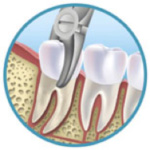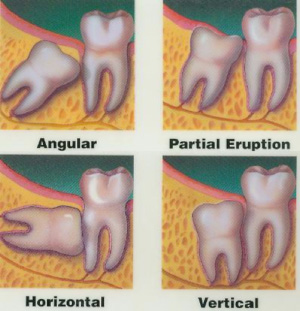 A dental extraction is simply the removal of a tooth from the mouth. Extractions are performed for a wide variety of reasons including tooth decay, tooth trauma, fractured teeth, infection, or because a tooth cannot be restored so the area is prepared for the placement of a bridge, or dental implant. Sometimes teeth are extracted to make room for orthodontic treatment.
A dental extraction is simply the removal of a tooth from the mouth. Extractions are performed for a wide variety of reasons including tooth decay, tooth trauma, fractured teeth, infection, or because a tooth cannot be restored so the area is prepared for the placement of a bridge, or dental implant. Sometimes teeth are extracted to make room for orthodontic treatment.
Many times teeth are extracted in what we refer to as an “addition by subtraction” model, as extractions in our office are done quickly and painlessly. Many times by removing a tooth, we can provide our patient with a healthier condition that adds to comfort. With the problem tooth gone, we can now concentrate on optimal dental health.
Wisdom Tooth Extraction
Wisdom teeth that are healthy and properly positioned can be an asset. In most cases, however, wisdom teeth remain impacted, trapped beneath the gum and bone and against the teeth in from of them. Dr. Chad Fine, Chandler Dentist, can diagnose if your wisdom teeth may be a potential hazard for your other teeth.
Why are Wisdom Teeth Sometimes Removed?
Because they are so far back in the mouth, wisdom teeth often are not needed for chewing and are difficult to keep clean. Dr. Fine may recommend the early removal of impacted wisdom teeth because waiting until you are older can increase complications.
 Removal of wisdom teeth can prevent these potential problems:
Removal of wisdom teeth can prevent these potential problems:
- A wisdom tooth partially erupting through the gum. This creates an opening where bacteria may enter and cause infection. Pain, swelling and jaw stiffness may result.
- An impacted wisdom tooth growing without having enough room, which may damage adjacent teeth.
- A fluid-filled sac (cyst) or tumor forming on or near an impacted tooth, destroying surrounding bone or tooth roots.
